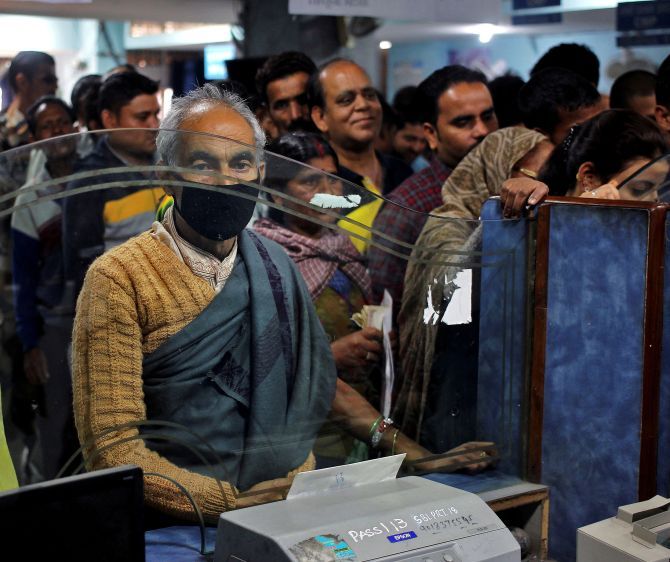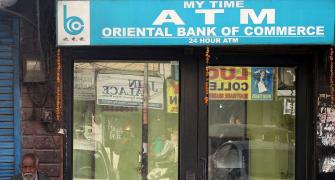If struggling with dealing with queues of people asking for new notes wasn't enough, banks now confront the challenge of storing the old notes in their strong rooms, reports Namrata Acharya.

With old notes piling up, banks now face the challenge of storing the currency.
In view of this spurt in deposits, banks have already increased insurance cover for cash in branches by up to three times the original size.
The problem of lifting cash worsens in rural areas, where some places have accumulated cash in excess of Rs 1,000 crore, according to a spokesperson of a regional rural bank.
In West Bengal, Grameen Bank alone has accumulated Rs 350 crore (Rs 3.5 billion) from four districts; the cash is waiting to be lifted by sponsor banks.
Although most banks have a strong room, the latter has limited capacity.
A strong room has strong walls and a strong door and is a place where valuable things can be kept safe.
Moreover, unless the old notes are lifted from smaller branches and sent over, those are seen as unproductive assets.
"Depending on the size of the branch, we are increasing insurance cover by two to three times. For example, earlier, at the branch level, if the insurance cover was Rs 10 crore (Rs 100 million), now it has been increased to Rs 35 crore (Rs 350 milliuon)", said Pawan Kumar Bajaj, managing director and chief executive, United Bank of India.
Ravi Krishan Takkar, chief executive officer and managing director, UCO Bank, confirmed that insurance cover for cash in bank had been increased after note ban.
In the last one week, the bank's cash collection was close to Rs 15,000 crore (Rs 150 billion).
"We have received a lot of requests for increasing insurance limit, both for cash storage as well as cash-carrying capacity. Most banks and cash-handling companies have sought 20% to 30% increase in insurance cover after the note ban," said K Sanath Kumar, chairman and managing director of the Kolkata-based National Insurance Company.
In view of the space crunch for cash at small branches, banks have taken up the issue with the Reserve Bank of India.
The problem of currency accumulation is more acute in smaller and rural branches, which are short of staff.
In a recent letter to the central government, the All India Regional Rural Bank Officers Federation said, 'In case of cash, chest facility has not been provided by RBI or authorities, and sponsor banks have been entrusted with the supply and collection of cash for rural branches. The experience of branches and their staff is sponsor banks have not come forward to help adequately and so staff have been facing serious problems and threat of public wrath as well as life threat, among others.'
"We have taken up the issue with the RBI, but our branches could clear half of the collections. However, the problem of cash storage persists. The van that comes for cash delivery is also being used for sending the cash back to chests. We have strong rooms in branches also. However, one loses interest in that unless cash is transferred to the currency chest," said Bajaj.
Also, protocol for currency movement from branches to chests requires a police contingent.
"A lot of currency has been accumulated at branches. Our first priority was to exchange and deposit," said Takkar. "If the currency is lying in branches, it becomes unproductive."










